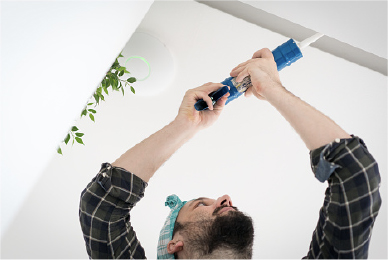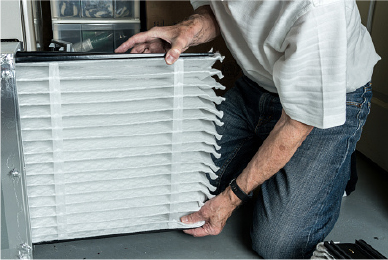
How to Keep Your Home in Tip Top Condition



Keeping your home in good condition will ensure it stays new for longer and that the products and appliances in your home have a greater longevity, saving you time and money while ultimately ensuring that you have more time to relax and enjoy your new home. This will, however, require some due diligence on your part, which is why we’ve listed some maintenance and cleaning items by month that will help you stay on top of keeping your home in tip top shape. If you spread your home maintenance tasks out throughout the year, it won’t seem like much work at all!
JANUARY
- Ensure that vent pipes for your furnace, hot water tank and ERV are clear of snow.
- As power outages are common during winter storms, make sure your home has a well-stocked survival kit.
- Open your blinds and curtains during the day to allow air to flow which will eliminate moisture/ condensation. If you do notice any condensation on your windows, be sure to wipe it down thoroughly.
- If you are leaving your home for an extended amount of time, turn your heat down to 10-15C. Don’t turn your heat off as this can cause your pipes to freeze. Have a friend or family member check your home periodically.
FEBRUARY
- Clear snow away from window well and the foundation of your home.
- If possible, carefully remove snow/ice from the roof overhangs/ vents.
- Check your humidity levels to make sure that they range from 40-45%.
- Use this time to clean the basement, garage and other interior spaces that can get neglected during the warmer months.
- Check air ducts, remove covers and vacuum dust from the vents and smoke alarms.
MARCH
- Clean or replace your furnace filter and clean your ERV filter. This will help your furnace and ERV run more efficiently.
- Head up to the attic and check for any leaks and make sure that the insulation is evenly spread throughout the attic.
- Check and reset ground fault circuit interrupter (GFCI). These are generally located on the exterior outlets, bathroom and kitchen.
- Check smoke alarms and carbon monoxide detectors. It’s a good idea to vacuum/ dust around your smoke alarm/ carbon monoxide detectors as dust and spider webs can contribute to them malfunctioning.
APRIL
- Check air intakes and exhaust to make sure that they are clear of debris, nests, etc.
- Clean out leaves and debris in eavestroughs and downspouts.
- Examine roof shingles to see if any were lost or damaged in the winter.
- Remove winter cover from A/C unit; inspect air conditioning unit, vacuum or brush the outdoor coil and wash and service as needed.
- Inspect your basement or crawl space for signs of seepage/ leakage & check for dampness or musty smells.
- Check your water heater for any leaks.
MAY
- Open outside hose connection and check for leaks.
- Inspect exterior caulking and replace if deteriorating. Scrape out all eroding caulk and re-caulk the necessary area.
- Lubricate garage door hinges.
- Clean your windows and check your window screens for any holes that may have appeared over the winter. Even the smallest holes could let bugs into your home.
- Check for condensation on your windows and ensure you wipe your windows down thoroughly if there is any condensation.
- Once you start opening your windows to enjoy the fresh air, you can turn your ERV to a lower setting. Remember that you want to keep the moisture level at 40-50%.
- Clean your patio door tracks, remove any dirt and debris and re lubricate to ensure a smoother slide.
- Thinking about a deck or fence? Ensure final grading has been approved by the municipality prior to deck and/or fence installations. For a refresher, refer to your lot survey provided by your lawyer with your closing documents for your property boundaries.
- If you plan on planting flowers or a garden, leave the grading ‘as is’ so water does not flow towards your home. (Grading was done according to the site plan that was approved by the municipality). *Please note – if you are a condominium owner, please consult with the property management company to obtain landscaping approval.
JUNE
- Prepare your cooling system. Proper air conditioner maintenance can help your A/C last longer.
- Dust ceiling fan blades and reverse the direction of your fans. If your fans spin counter-clockwise, they will push the air straight down to keep your room nice and cool.
- Replace cracked caulking around windows and doors.
- Clean your ERV and furnace filters.
- Condensation is very common in new homes; your basement wrap insulation is compressed and meant to get damp due to concrete condensation, it will not mold. If you find areas that are wetter than others, cut the wrap (turn on dehumidifier and once it’s dry), re tape with red insulation tape. *Note that we always suggest that new homeowners run a dehumidifier if presence of condensation occurs in basement during summer months.
- Some of our homes contain sump pumps, these should be periodically checked to verify that the pump is working.
JULY
- If you are leaving your home for an extended vacation, remember to turn off the main water to your home and have a friend or family member come and check your home periodically for water leaks.
- If you have A/C running or your windows open, set your ERV to come on intermittently. The humidity level in your home should still range from 40-45% even in the summer.
- If you receive sod, it must be watered within 24 hours of installation. In daytime temperatures above 25C, sod should be watered every day and avoid walking on freshly laid sod. *Please note – it’s best to avoid watering between 11am and 3pm.
- Take care of any insect problems you may have. Ants, spiders and other little crawlers will look for the tiniest hole to be able to get into your home.
- Check dryer exhaust and clean out any lint buildup or blockages.
AUGUST
- Complete exterior paint touch-ups where needed.
- Bathroom fans can collect dust, which can make them noisy and inefficient. Remove the cover and vacuum out any dust.
- Vacuum the coils on the back of your refrigerator. Over time, a lot of dust can collect behind your refrigerator.
- Check and reset ground fault circuit interrupter (GFCI). These are located in the kitchen and bathrooms.
SEPTEMBER
- Check your roof for any damaged shingles.
- Seal any cracks or gaps on the exterior of your house.
- Clean and store any outdoor furniture.
- Where applicable, service your fireplace and remove any embers.
OCTOBER
- Clean out the gutters and downspouts.
- Remove excess leaves from the yard and any other fall debris.
- Have your heating and ERV system inspected by the company that installed it. Just like a car needs an oil change, your home’s mechanical system requires a tune-up annually in order for your mechanical system to work efficiently.
- Winterize your lawn mower by adding fuel stabilizer in it.
NOVEMBER
- Turn off the valves to the exterior hose bibs. Run the water until the pipes are empty to prevent any pipes from bursting.
- Check your humidity levels to make sure that they range from 40-45%.
- Keep blinds open to prevent condensation on your windows.
- Check your smoke detectors.
DECEMBER
- Avoid using salt on concrete steps as it can be damaging. Try to use sand instead.
- Check and reset your GFCI outlets.
- Clean/Change your furnace filter and ERV filter.
- If you have ceiling fans, change the direction of the fan. This will force the hot air downwards.

For further information on items that are covered under the Tarion Warranty, please review the Construction Performance Guidelines on the Tarion Website.
Explore Now